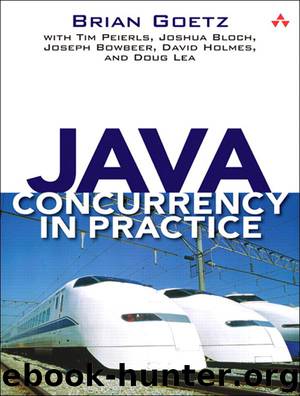Java Concurrency in Practice (Brenda Evans' Library) by Brian Goetz & Tim Peierls & Joshua Bloch & Joseph Bowbeer & David Holmes & Doug Lea

Author:Brian Goetz & Tim Peierls & Joshua Bloch & Joseph Bowbeer & David Holmes & Doug Lea
Language: eng
Format: epub
Publisher: Addison Wesley
Published: 2006-02-12T16:00:00+00:00
* * *
Strive to use open calls throughout your program. Programs that rely on open calls are far easier to analyze for deadlock-freedom than those that allow calls to alien methods with locks held.
* * *
Restructuring a synchronized block to allow open calls can sometimes have undesirable consequences, since it takes an operation that was atomic and makes it not atomic. In many cases, the loss of atomicity is perfectly acceptable; there's no reason that updating a taxi's location and notifying the dispatcher that it is ready for a new destination need be an atomic operation. In other cases, the loss of atomicity is noticeable but the semantic changes are still acceptable. In the deadlock-prone version, getImage produces a complete snapshot of the fleet locations at that instant; in the refactored version, it fetches the location of each taxi at slightly different times.
In some cases, however, the loss of atomicity is a problem, and here you will have to use another technique to achieve atomicity. One such technique is to structure a concurrent object so that only one thread can execute the code path following the open call. For example, when shutting down a service, you may want to wait for in-progress operations to complete and then release resources used by the service. Holding the service lock while waiting for operations to complete is inherently deadlock-prone, but releasing the service lock before the service is shut down may let other threads start new operations. The solution is to hold the lock long enough to update the service state to “shutting down” so that other threads wanting to start new operations—including shutting down the service—see that the service is unavailable, and do not try. You can then wait for shutdown to complete, knowing that only the shutdown thread has access to the service state after the open call completes. Thus, rather than using locking to keep the other threads out of a critical section of code, this technique relies on constructing protocols so that other threads don't try to get in.
Download
This site does not store any files on its server. We only index and link to content provided by other sites. Please contact the content providers to delete copyright contents if any and email us, we'll remove relevant links or contents immediately.
| Ajax | Assembly Language Programming |
| Borland Delphi | C & C++ |
| C# | CSS |
| Compiler Design | Compilers |
| DHTML | Debugging |
| Delphi | Fortran |
| Java | Lisp |
| Perl | Prolog |
| Python | RPG |
| Ruby | Swift |
| Visual Basic | XHTML |
| XML | XSL |
The Mikado Method by Ola Ellnestam Daniel Brolund(22540)
Hello! Python by Anthony Briggs(21721)
Secrets of the JavaScript Ninja by John Resig Bear Bibeault(20296)
Dependency Injection in .NET by Mark Seemann(19635)
The Well-Grounded Java Developer by Benjamin J. Evans Martijn Verburg(19403)
Kotlin in Action by Dmitry Jemerov(19348)
OCA Java SE 8 Programmer I Certification Guide by Mala Gupta(18840)
Algorithms of the Intelligent Web by Haralambos Marmanis;Dmitry Babenko(17650)
Adobe Camera Raw For Digital Photographers Only by Rob Sheppard(16968)
Grails in Action by Glen Smith Peter Ledbrook(16799)
Test-Driven iOS Development with Swift 4 by Dominik Hauser(10948)
Becoming a Dynamics 365 Finance and Supply Chain Solution Architect by Brent Dawson(8069)
Microservices with Go by Alexander Shuiskov(7834)
Practical Design Patterns for Java Developers by Miroslav Wengner(7733)
Test Automation Engineering Handbook by Manikandan Sambamurthy(7695)
Angular Projects - Third Edition by Aristeidis Bampakos(7181)
The Art of Crafting User Stories by The Art of Crafting User Stories(6627)
NetSuite for Consultants - Second Edition by Peter Ries(6546)
Demystifying Cryptography with OpenSSL 3.0 by Alexei Khlebnikov(6324)
